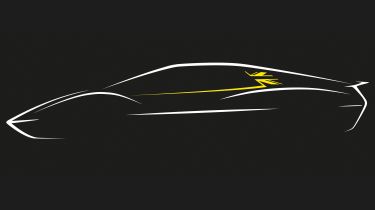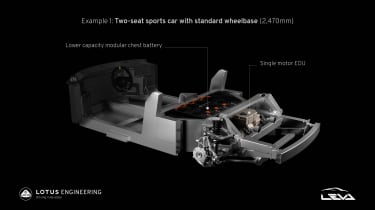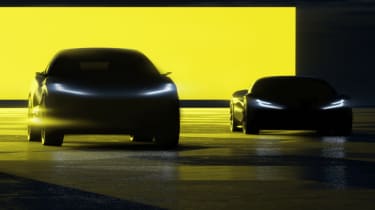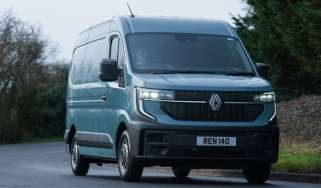Lotus electric sports car teased ahead of 2026 launch
The first zero-emissions Lotus sports car is set to arrive in 2026, following on from the Evija electric hypercar, a series of electric SUVs and a four-door coupe

Lotus’ first fully electric sports car doesn't arrive until 2026, but that hasn’t stopped the British brand from beginning to hint at details. Back in September 2021, we learned it would share an all-new platform with the next-generation Alpine A110; now, we’ve got our first hints of the Elise successor's styling.
The silhouette Lotus revealed bears a striking resemblance to the brand’s iconic mid-engined Esprit supercar, featuring a similar shape overall, as well as a particularly sharp nose design. Meanwhile, the more pronounced haunches at the front and rear are more in line with the Evija and recently introduced Emira sports car: the last combustion-engined model the brand will produce.
The teaser was released along with the announcement that Lotus will work with battery specialist Britishvolt to develop battery technology key to the as-yet-unnamed model, as well as other future electric Lotus sports cars.
In addition to the new batteries, Lotus has previously unveiled the LEVA (Lightweight Electric Vehicle Architecture) that’ll serve as a vital component of the 'E-Sports' platform sitting under its electric sports car, as well as French performance-car maker Alpine’s zero-emissions successor to the A110.
According to Lotus, the new electrified rear subframe can be configured for use in a variety of cars. Potential applications include a small two-seat sports car, a two-seat sports car with a longer wheelbase and a '2+2' with small rear seats. It can accomodate battery sizes from 66.4 to 99.6kWh, and house one or two electric motors, producing as much as 872bhp.
The smaller two-seat sports car Lotus used as its first example has a wheelbase of at least 2,470mm – around 100mm shorter than the petrol-powered Emira – with power coming from a single 469bhp electric motor. Meanwhile, the longer and larger two-seat sports car would be fitted with the sizable 99.6kWh battery and make 872bhp, but power would still go to the rear wheels only.
Finally, the 2+2 sports car gets a choice of either single or dual-motor setups, and uses a different type of battery called a ‘Slab’, which is fitted under the floor as opposed to behind the cabin in the other two applications, which use what Lotus refers to as a ‘Chest’ unit. According to Lotus, this new platform is 37% lighter than the one fitted to the Emira.
Lotus previously confirmed that its first electric sports car will arrive in 2026. It's currently referred to as the Type 135 and will be manufactured in the UK – much like the brand’s £2 million Evija zero-emissions hypercar, which pumps out an impressive 1,972bhp.
Before the Type 135 arrives, the next electric model from Lotus will be a large SUV – the first in the company’s history. Codenamed Type 132, the forthcoming Tesla Model Y rival is set to be unveiled in spring 2022.
Then, 2023 will see the arrival of a similarly sized four-door coupe, referred to as Type 133, which could be a direct rival for the Tesla Model S. In 2024, Lotus will launch a smaller ‘D-segment’ SUV, known as Type 134, with the size of the car suggesting it'll be a rival for the BMW iX3 or the electric Porsche Macan we know is on the way.
These three 'lifestyle' models will all be built in China on the newly developed Premium Architecture, which can fit batteries from 90 to 120kWh and features 800-volt charging, as used by the Porsche Taycan, Audi e-tron GT, Hyundai Ioniq 5 and Kia EV6. That should allow for similar ultra-rapid charging speeds as all those models.
Most Popular

EV Deal of the Day: Dacia Spring is amazingly good value at £116 per month




